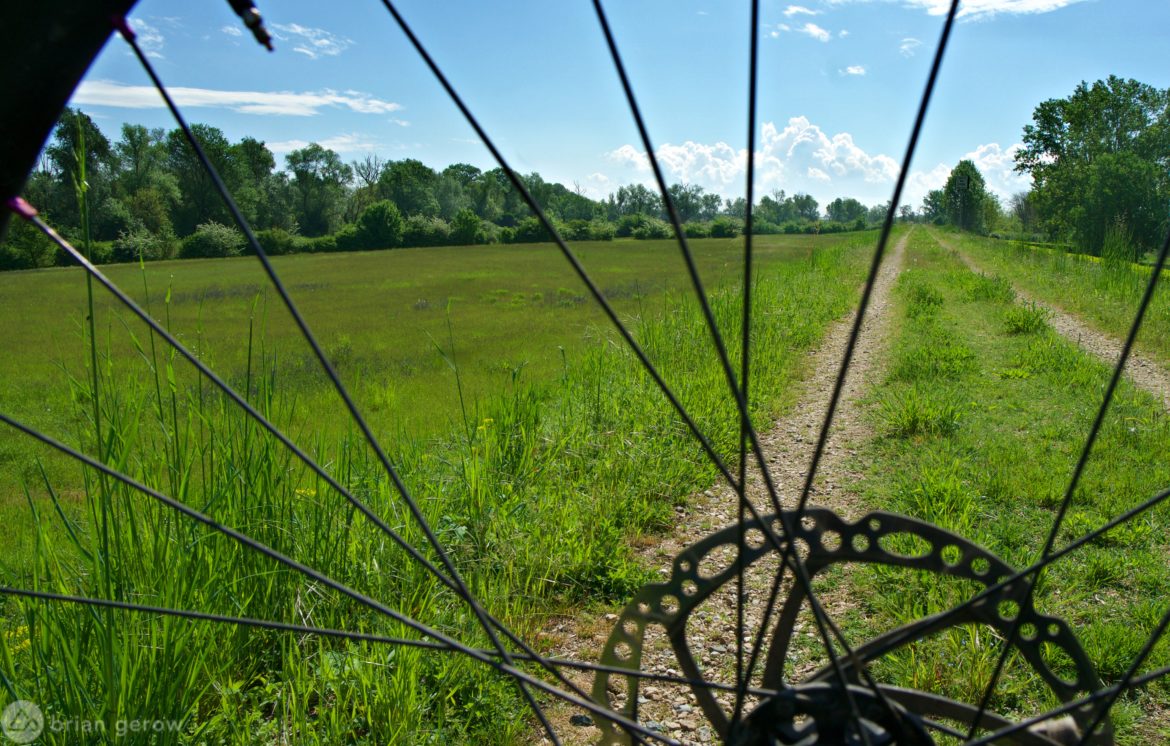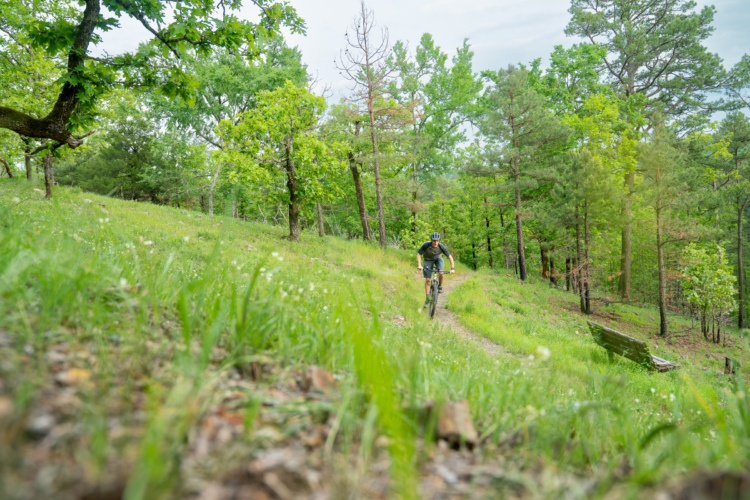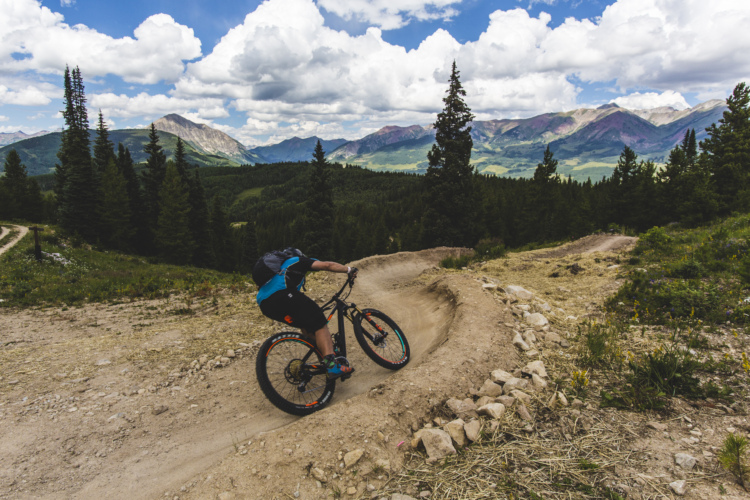
We grew up on rural gravel roads, riding whatever bike had enough air left in the tires.
It was late summer in the Selkirk mountains of Priest Lake, Idaho, and mosquitos streamed from the cabin’s septic tank cover that served as their rightful mothership. The Nitty Gritty Dirt Band’s latest tune blared through the shade of native western red cedar, bouncing off their towering trunks, taller than all of us ratty river-kids combined, and older than our greatest-grandparents.
An early memory of balancing between two wheels sits atop my grandma Gladys’s brown mixte, on a graveled county road outside that cabin. The generator light on grandma’s bike likely had more heft than the frame of its modern equivalent. I was pedaling with all of the kid-angst and excitement I could muster, to lock up the rear tire and whip-skid into the driveway in front of my sister or cousin who were waiting for their turn on the bike. I try to remember that kid and to have that kind of fun playing in the dirt today.
Those first whip-skids led to a lifetime of playing on bikes that I feel fortunate to continue. I went on to race cyclocross, road, and mountain bikes, and joined a supportive community of people who are equally infatuated with the rush of balance and traction. Most of the bike racers and riders I know have their own narrative of riding gravel-packed roads. Some folks grew up in rural areas, where gravel streets were far better than the dirt and mud roads that preceded them. The size-specific stones in the road help the surface drain and keep dust and mud in check. The bits of broken tarmac highway served as a spine for their broader gravel rib cage, but that smoother spine was too dangerous to pedal along.

The advent of “gravel bike” marketing over the past several seasons has made me giggle on a regular basis. I imagine someone at a bike company that makes fine cyclocross frames proposing to their marketing team, “we all love epic dirt-road rides, so why don’t we repaint our cyclocross bikes and sell them as gravel bikes. Who knows, It might just become the new and cool genre of cycling.” This someone was rightly laughed out of the room, then eventually the idea was given further consideration, and now we have a burgeoning industry segment of cyclocross bikes with slightly lower bottom brackets and wider tires, ready to ride where no one has ridden before. On gravel roads.

The reasons why mountain bikers and road cyclists enjoy riding gravel are many and good. You can still ride while the singletrack dries out, there is often less traffic when you leave the pavement, the auditory feedback from tires on slightly shifting stones is fantastic, you have a reason to use larger and cozier tires on a road ride, you get to geek out on different gear, and all of the other benefits of cycling are sprinkled on top of this lovely gravel cupcake.
Do we need specific bikes that bear the “gravel” moniker for rolling over the same smashed stones we have always pedaled on mountain bikes, ‘cross bikes, or road bikes? There are plenty of cycling genres that require purpose-built machines to improve the riding and racing experience, but the gravel scene hasn’t made a strong case for its gear. Until convinced otherwise, I am going to chalk the gravel-hype up to exceptionally adept marketing, and continue to have a laugh at the “latest gravel tech” news.
On rainy days, when the trails are too wet to respectfully shred, I ride my trusty hardtail or cyclocross race bikes on dirt and gravel roads to maintain fitness. I also ride my long travel mountain bike on gravel roads, sometimes climbing for 3-4 consecutive hours to reach some of the best trails available. So, are all of my bikes gravel bikes? When I ride them on gravel — I suppose they are.










18 Comments
Apr 30, 2019
"I personally am a big fan of having the right tool, but one tool that can cover a lot of purposes is far better a hyper-specialized version that collects dust in the shed."
The irony of the situation is that cyclocross bikes are, historically speaking, hyper-specialized and LESS capable bikes, because they have to conform to antiquated rules and regulations for cyclocross racing. Those rules and regs are changing slowly, but people specifically designing all-road bikes are able to better optimize these machines for versatility, without conforming to those regulations.
I think it also helps to think about this question: if you don't already own a cyclocross bike or an all-road bike, and you don't plan to race 'cross competitively, which would you rather purchase?
At least, that's my reading of the situation ;)
Apr 30, 2019
I find gravel bikes to be the opposite. Most people I sell them to are looking for one bike to do everything. Gravel bikes (especially the high end ones) do happen to be the "right tool" for one specific thing, gravel racing, but they also happen to be the perfect choice for a person looking for one bike to do most everything. I still think the 29'er hardtail is the best choice for "one bike to rule them all" and if I was forced to own only one bike it would be that. But if you don't care about riding technical singletrack, gravel is the way to go for a new bike purchaser.
Compared to cyclocross bikes, gravel bikes not only have lower bottom brackets, they have longer, more stable wheel bases, slacker, more comfortable head tube angles, loads of water bottle and accessory braze ons, and wider stock gearing ranges. All of these features make them a better choice for the average consumer over a cyclocross bike. Most manufacturers are axing entry level cross bikes from their line ups, and replacing them with gravel bikes. So they aren't N+1, so much as an evolution of the utility cyclocross bike.
The one thing that is disappointing to me about this is that I'm worried cyclocross as a race discipline will suffer. Yes, you can race a gravel bike in a cross race, but they aren't as fun- without the steep head angle you'll be turning into the tape more often than you'd like. But the average person who purchases an entry level cross bike, will never race cross. They will be much happier without the twitchy handling of a true cross bike on long descents. Also, gravel bikes handle a load much better than cross bikes do. A real cross bike doesn't even have water bottle mounts, let alone rack and fender mounts! To me the only bad thing to come out of the gravel movement is the barrier to entry to cross racing just got a little higher, but thinking back I did my first cross race on a single speed converted univega sport tourer from the 80's. Cross has always been, and will always be, run what you brung in the beginner categories.
Think of the entry level gravel bike as the evolution of the entry level cross bike. They are truly a better choice for the average consumer. Think of the race cross bike as a specialized tool for racers, and the race gravel bike as the same. If you race at a high level, hyper specialization is a necessity.
Apr 30, 2019
Apr 29, 2019
Apr 29, 2019
May 1, 2019
Apr 29, 2019
There has always been a gap between between the fast-rolling skinny slick Road tire and the big-traction wide knobby Mountain tire. But, what if we design a tire that rolls fast on pavement but also hooks up on dirt? So, in my mind, a Gravelbike is all about the Gravel tire. Any bike that has tires that roll fast on pavement but also hook up on dirt is a Gravelbike and it doesn't matter what geometry it has, whether it has flatbars or dropbars, or whether it's full-rigid, or full-suspension.
When Gravelbikes first came out, I was a bit dubious. However, I had an old hardtail on which I mounted a set of 700x45 Gravel tires and the bike is a total blast to ride on both pavement and gravel. In fact, I like my hardtail Gravelbike so much that I gave my old Roadbike to charity because I didn't ride it anymore.
When more people discover how much fun Gravelbikes are, I don't think many people will buy Roadbikes. Don't get me wrong! Mountain biking on singletrack is still my favorite sport but Gravel biking is a close second and is so much more fun than Road biking. On top of that, I think Gravelbikes also make a great Touring/Bikepacking bikes. Scoff at Gravelbikes if you want but if you love cycling, you'll own a Gravelbike some day.
My only complaint about Gravelbikes is that the current paradigm for a Gravelbike is a dropbar Roadbike with Gravel tires. I think that a flatbar Mountainbike with Gravel tires is also a legitimate paradigm for a Gravelbike. Sure enough, bike manufacturers are just starting to make Gravelbikes with relaxed geometries, flatbars, and suspension.
Apr 30, 2019
Where I disagree, though, is that I do think there is a significant difference in the design of a gravel bike over a cross bike. The two are definitely not the same; spending hours on rugged gravel roads of all varieties will make that distinction come to light pretty quickly. The newer gravel bikes (sure a lot is just marketing) are getting even better at gravel specific cycling. So if your love is to race/ride gravel, then opting for a gravel specific bike makes a lot of sense. My two cents.
Apr 30, 2019
For our readers who are researching new bikes to ride on dirt roads, can you share some of the significant differences that you appreciate between cyclocross and gravel bikes?
We have mentioned wider tire clearance, and a lower bottom bracket. What are some of your favorite elements of those new gravel-specific bikes?
May 2, 2019
Apr 30, 2019
Apr 30, 2019
Apr 30, 2019
It's clear that there are a lot of passionate readers enjoying some gravel roads out there.
This is the most active response thread that any of my articles have received without the word "ebike" slipped someplace in the text.
As I have written before, some articles exist to inspire, enrich, or inform, and others serve only to ignite conversation.
Tailwinds to all!
Apr 30, 2019
May 1, 2019
Apr 29, 2019
Personally, if the main problem here is the label "gravel", then I like the new-er label that some brands are beginning to use: "all road." To me, this sums it up perfectly and shows why I bought this bike. Standard road bikes are way too limiting in places of the world where only the main road arteries are paved. All road bikes, on the other hand, let you ride ALL the roads in a given area :)
Apr 29, 2019
Greg, I dig the all-road moves. The "all-road" style of riding is exactly why I keep two XC hardtails and a cyclocross bike in my basement. They let me ride everything but the steeper and more technical trails, while those trails dry out. I can explore nearly anywhere on them, and mount up whatever tire suits the day. I totally agree.
The conundrum, for me, is with gravel bikes that are nothing more than slightly altered cyclocross bikes, market to coax folks into the N+1 mess. They are uber popular where I live. I personally am a big fan of having the right tool, but one tool that can cover a lot of purposes is far better a hyper-specialized version that collects dust in the shed.
Apr 29, 2019